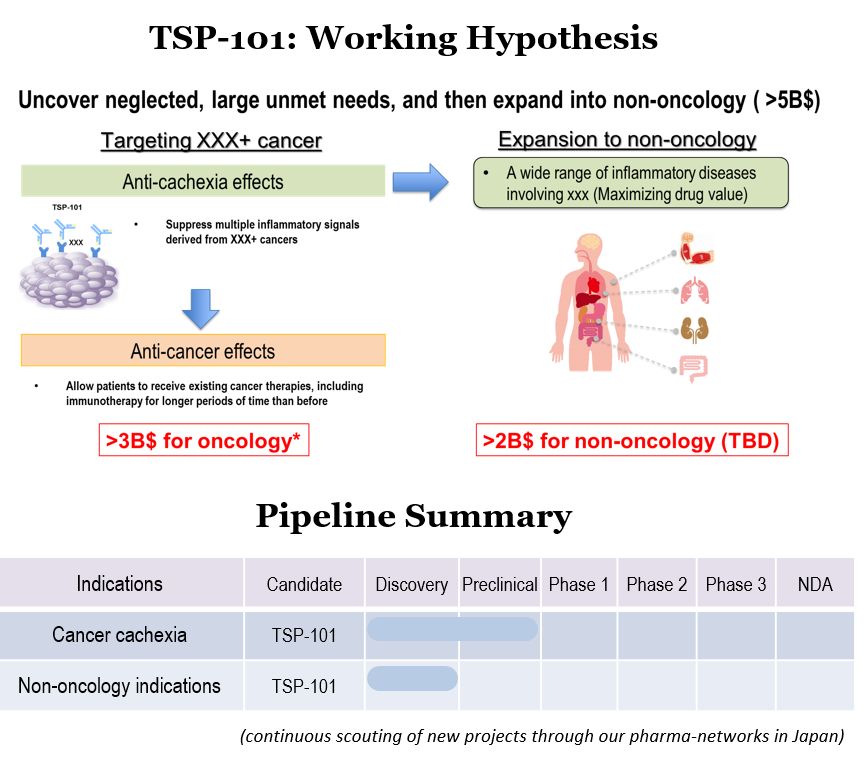TSP-101
Tensegrity Pharma is currently developing TSP-101, which is expected to have anti-cachexia effects by blocking the signaling of specific factors over-expressed in various cancers with high incidence of cachexia and suppressing cancer-derived inflammatory responses, as well as anticancer effects by improving the tumor microenvironment. We have taken over the project in preclinical development that was discontinued by Astellas Pharma Inc. for strategic reasons, and we aim to achieve proof of concept (POC) in clinical trials as quickly as possible by taking it into phase 1/2 clinical trials as TSP-101.
TSP-102 is the same new molecukar entity as TSP-101 tagetingn non-oncology indications.
What is Cachexia?
Cachexia is a syndrome characterized by weight loss associated with chronic diseases such as cancer, cardiac disease, and infections, though the underlying mechanisms remain largely unexplained. There are no effective medical interventions or approved drugs for the condition. Recent research has revealed that multiple molecular mechanisms are involved in the pathogenesis of cachexia, including skeletal muscle, fat tissue, digestive organs, central nervous system, and immune system. Cancer-related cachexia, in particular, is a multifactorial disorder that is difficult to recover from with ordinary nutritional support and is primarily characterized by sustained skeletal muscle loss. Factors released by the tumor, tumor-induced systemic inflammatory reactions, and metabolic changes are deeply involved in the pathogenesis. This complication, which occurs in up to 80% of cancer patients, is known to cause weight loss and loss of appetite, reduced chemotherapy efficacy, increased side effects, and treatment
interruptions, and correlates with reduced overall survival of cancer patients.
Tensegrity Pharma is currently developing TSP-101, which is expected to have anti-cachexia effects by blocking the signaling of specific factors over-expressed in various cancers with high incidence of cachexia and suppressing cancer-derived inflammatory responses, as well as anticancer effects by improving the tumor microenvironment. We have taken over the project in preclinical development that was discontinued by Astellas Pharma Inc. for strategic reasons, and we aim to achieve proof of concept (POC) in clinical trials as quickly as possible by taking it into phase 1/2 clinical trials as TSP-101.
TSP-102 is the same new molecukar entity as TSP-101 tagetingn non-oncology indications.
What is Cachexia?
Cachexia is a syndrome characterized by weight loss associated with chronic diseases such as cancer, cardiac disease, and infections, though the underlying mechanisms remain largely unexplained. There are no effective medical interventions or approved drugs for the condition. Recent research has revealed that multiple molecular mechanisms are involved in the pathogenesis of cachexia, including skeletal muscle, fat tissue, digestive organs, central nervous system, and immune system. Cancer-related cachexia, in particular, is a multifactorial disorder that is difficult to recover from with ordinary nutritional support and is primarily characterized by sustained skeletal muscle loss. Factors released by the tumor, tumor-induced systemic inflammatory reactions, and metabolic changes are deeply involved in the pathogenesis. This complication, which occurs in up to 80% of cancer patients, is known to cause weight loss and loss of appetite, reduced chemotherapy efficacy, increased side effects, and treatment
interruptions, and correlates with reduced overall survival of cancer patients.

